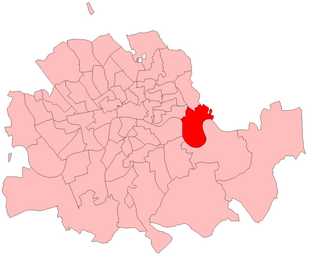
George Lansbury was a British politician and social reformer who led the Labour Party from 1932 to 1935. Apart from a brief period of ministerial office during the Labour government of 1929–31, he spent his political life campaigning against established authority and vested interests, his main causes being the promotion of social justice, women's rights, and world disarmament.

Poplar was a local government district in the metropolitan area of London, England. It was formed as a district of the Metropolis in 1855 and became a metropolitan borough in the County of London in 1900. It comprised Poplar, Millwall, Bromley-by-Bow and Bow as well as Old Ford, Fish Island and Cubitt Town.

Bow is an area of east London, England, within the London Borough of Tower Hamlets, 4.6 miles (7.4 km) east of Charing Cross.

Arabella Susan Lawrence was a British Labour Party politician, one of the earliest female Labour MPs.

Newham London Borough Council is the local authority for the London Borough of Newham. It is a London borough council, one of 32 in the United Kingdom capital of London. The council is unusual in that its executive function is controlled by a directly elected mayor of Newham, currently Rokhsana Fiaz. The council was created by the London Government Act 1963 and replaced four local authorities: East Ham Borough Council, West Ham Borough Council, Barking Borough Council and Woolwich Metropolitan Borough Council.

Bow and Bromley was a constituency in the Parliament of the United Kingdom. Located in the Metropolitan Borough of Poplar in London, it was created by the Redistribution of Seats Act for the 1885 general election and returned one Member of Parliament (MP) until it was abolished for the 1950 general election.

Charles William Key, PC was a British schoolmaster and Labour Party politician. Coming from a very working-class background, the generosity of a family friend made it possible for him to get a start in life and train as a teacher; he entered politics through Poplar Borough Council, and was elected to Parliament to replace George Lansbury. Serving in junior posts during the Attlee government, he remained in Parliament until the age of 80.

John Scurr was an English Labour Party politician and trade union official who served as Member of Parliament (MP) for Mile End from 1923 to 1931.
Minnie Lansbury was an English leading suffragette and an alderman on the first Labour-led council in the Metropolitan Borough of Poplar, England.

Lambeth London Borough Council is the local authority for the London Borough of Lambeth in Greater London, England. It is a London borough council, and one of the 32 in the United Kingdom capital of London. The council meets at Lambeth Town Hall in Brixton. Lambeth is divided into 25 wards: thirteen are represented by 3 councillors and twelve are represented by 2. The council was first elected in 1964.

Tower Hamlets London Borough Council is the local authority for the London Borough of Tower Hamlets in Greater London, England. The council is unusual in that its executive function is controlled by a directly elected mayor of Tower Hamlets, currently Lutfur Rahman.
Edgar Isaac Lansbury was a British Communist politician. His daughter was the English-American actress Angela Lansbury.

The rate-capping rebellion was a campaign within English local councils in 1985 which aimed to force the Conservative government of Margaret Thatcher to withdraw powers to restrict the spending of councils. The affected councils were almost all run by left-wing Labour Party leaderships. The campaign's tactic was that councils whose budgets were restricted would refuse to set any budget at all for the financial year 1985–86, requiring the government to intervene directly in providing local services, or to concede. However, all fifteen councils which initially refused to set a rate eventually did so, and the campaign failed to change government policy. Powers to restrict council budgets have remained in place ever since.

The 1914 Poplar by-election was a Parliamentary by-election held on 19 February 1914. The constituency returned one Member of Parliament (MP) to the House of Commons of the United Kingdom, elected by the first past the post voting system.
Nellie Frances Cressall (1882–1973) was an East End suffragette and labour activist.
Samuel March was a British trade union official and Labour Party politician active in the Poplar area of London.

The Poplar Rates Rebellion Mural is a mural in Hale Street, Poplar, London, London. It is painted on the wall of the depot of Tower Hamlets Parks Department.

Julia Scurr was a British politician and suffragette.
Christopher John Kelly was a British politician and trade unionist, who served on London County Council, but was later convicted of theft.
Charles Edwin Sumner was a British politician and trade unionist, who served on London County Council.

















